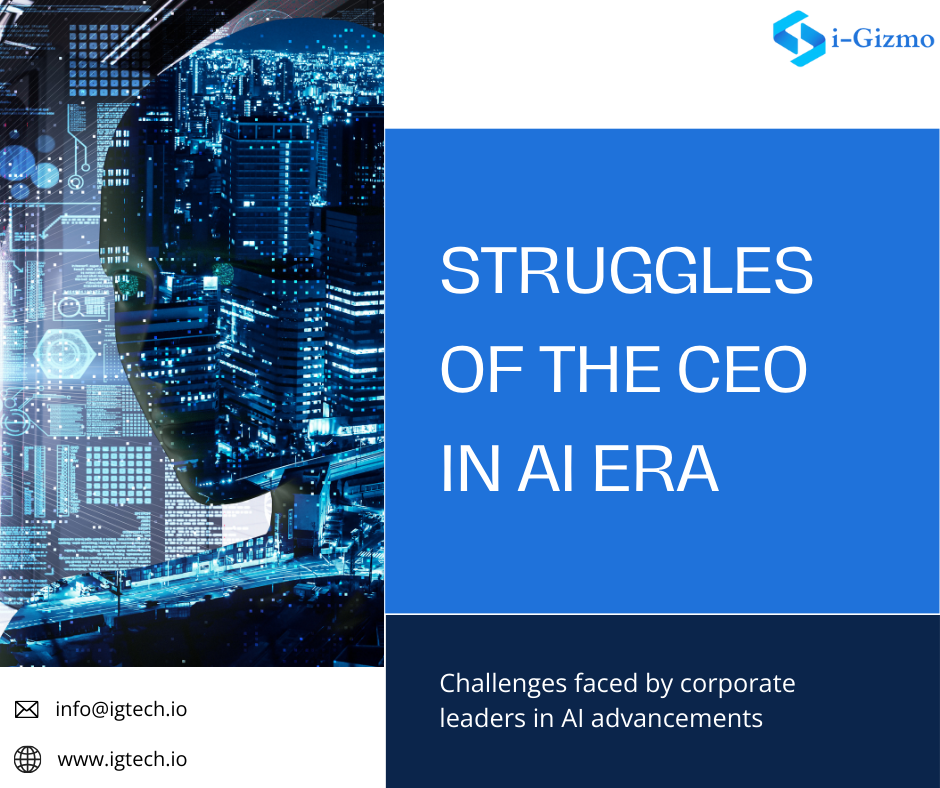In today’s rapidly evolving technological landscape, CEOs face a unique set of challenges as they navigate the integration of artificial intelligence (AI) into their organizations.
i-Gizmo has listed some of the primary concerns and obstacles:
~ Keeping Pace with Technological Advancements
-
Rapid Changes: AI technology is advancing at a breakneck speed, making it difficult for CEOs to stay updated and ensure their company remains competitive.
-
Skill Gaps: Finding and retaining talent with the necessary AI expertise is a significant challenge.
-
Instance: Satya Nadella, CEO of Microsoft, continuously invests in AI research and development to keep Microsoft at the forefront of AI innovation. He has to ensure that the company’s AI capabilities remain cutting-edge while adapting to rapid technological changes.
~ Strategic Implementation
-
Integration: Effectively integrating AI into existing processes and systems without disrupting operations is a complex task.
-
Alignment: Ensuring that AI initiatives align with the company’s overall strategy and goals can be difficult.
-
Instance: Sundar Pichai, CEO of Google, faces the challenge of integrating AI into Google’s vast array of services. Balancing AI development with the company’s existing product portfolio, like search and advertising, requires strategic alignment.
~ Ethical and Regulatory Compliance
-
Ethical Dilemmas: CEOs must navigate the ethical implications of AI, such as data privacy, bias, and the impact on employment.
-
Regulatory Landscape: Keeping up with and complying with evolving regulations related to AI is a constant concern.
-
Instance: Mark Zuckerberg, CEO of Facebook (Meta), has dealt with significant ethical and regulatory challenges regarding data privacy and the ethical use of AI. Issues such as Cambridge Analytica have highlighted the complexities of managing AI ethics and compliance.
~ Cost and Resource Allocation
-
Investment: AI projects require significant investment, and CEOs must balance these costs with other business priorities.
-
ROI: Demonstrating a clear return on investment for AI initiatives to stakeholders can be challenging.
-
Instance: Elon Musk, CEO of Tesla, has to allocate significant resources to AI development for autonomous driving. Balancing the high costs of AI R&D with the need for profitability and other business investments is a constant challenge.
~ Change Management
-
Cultural Shift: Fostering a culture that embraces AI and digital transformation requires careful change management.
-
Resistance: Overcoming resistance from employees who fear job displacement or are wary of new technologies is a common issue.
-
Instance: Ginni Rometty, former CEO of IBM, led the company through a significant transformation to focus on AI and cloud computing. She had to manage the cultural shift within the organization and address employee concerns about job displacement.
~ Security Concerns
-
Data Security: Protecting sensitive data in an AI-driven environment is critical, with cybersecurity threats becoming more sophisticated.
-
System Vulnerabilities: Ensuring AI systems are robust and secure against potential attacks is a major responsibility.
-
Instance: Jamie Dimon, CEO of JPMorgan Chase, oversees the implementation of AI in financial services. Ensuring robust cybersecurity measures to protect sensitive financial data and AI systems from cyber threats is a top priority.
~ Maintaining Competitive Edge
-
Innovation: Constantly innovating and leveraging AI to gain a competitive edge requires foresight and agility.
-
Benchmarking: CEOs must continuously benchmark their AI capabilities against competitors to stay ahead.
-
Instance: Jeff Bezos, former CEO of Amazon, invested heavily in AI to enhance the company’s logistics, recommendation algorithms, and Alexa. Staying ahead of competitors like Walmart and Alibaba in the AI race required continuous innovation.
~ Customer Expectations
-
Personalization: Customers increasingly expect personalized experiences, and AI can help meet these demands, but implementing it effectively is challenging.
-
Transparency: Maintaining transparency in AI-driven decisions and ensuring customer trust is paramount.
-
Instance: Tim Cook, CEO of Apple, must ensure that AI-powered features in products like Siri and Apple’s recommendation systems meet high customer expectations for personalization and performance while maintaining privacy standards.
~ Sustainability
-
Environmental Impact: CEOs must consider the environmental impact of AI technologies and strive to implement sustainable practices.
-
Social Responsibility: Balancing AI advancements with corporate social responsibility initiatives is a growing concern.
-
Instance: Larry Fink, CEO of BlackRock, emphasizes the importance of sustainability in AI investments. He advocates for using AI to develop sustainable finance solutions, balancing technological advancement with environmental and social responsibility.
Summation:
CEOs in the era of AI face multifaceted challenges, from staying abreast of technological advancements and ethical considerations to managing costs and fostering innovation. Successfully navigating these complexities requires a strategic, informed and adaptable approach to harness the full potential of AI while mitigating its risks.
#AIBusiness #DigitalTransformation #FutureOfWork #TechLeadership #BusinessGrowth #StrategicPlanning #InnovationStrategy #AIEthics #DataPrivacy #CustomerEngagement #Personalization #CyberSecurity #RiskManagement #WorkforceTransformation #ChangeManagement #SustainableTech #GreenTech #Sustainability #igizmo I-Gizmo Global Technologies




